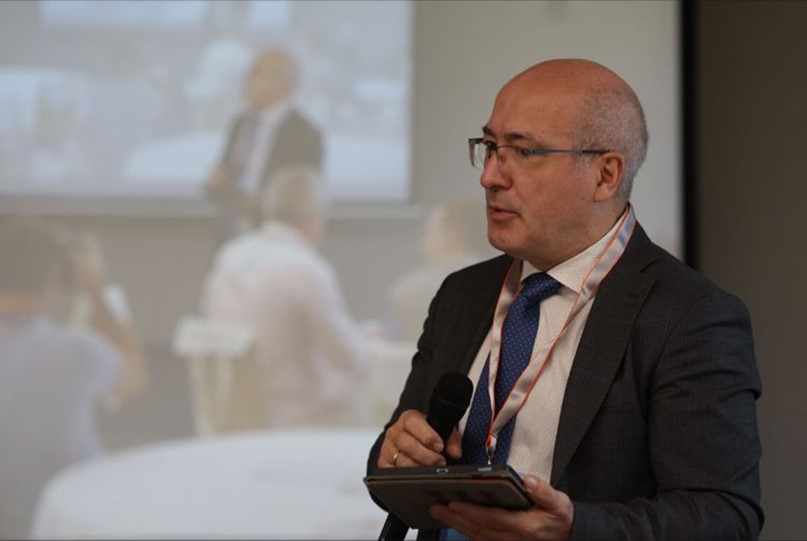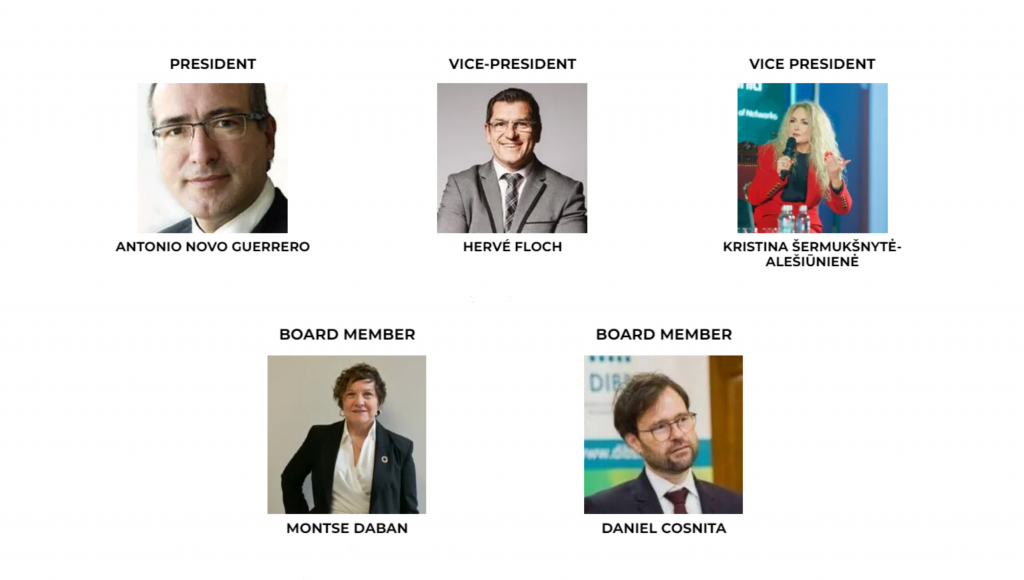Antonio Novo, President of the Spanish Federation of Clusters and managing director of the Aragonese cluster IDiA, was re-elected as President of the European Cluster Alliance for a further four years at the General Assembly of the European Cluster Alliance in October this year. Kristina Šermukšnytė-Alešiūnienė, Director of the Cluster and Digital Innovation Centre AgriFood Lithuania and Director of the Lithuanian cluster network KlasterLT, has become the new Vice President. An expert in the agrifood sector was awarded the title of the European Cluster Manager of the Year 2022.
In addition to K. Šermukšnytė-Alešiūnienė, the Alliance’s Board of Directors has been joined by another woman, Montse Daban (Council of European BioRegions – CEBR). She will be the ECA representative in the “Friends of the EEN” group to strengthen the relation between the European Clusters Alliance and the Enterprise Europe Network (EEN).
Hervé Floch (AFPC, France) was renewed as Vice-President, and Daniel Cosnita (CLUSTERO, Romania) as Secretary. Both have been greatly involvement in the development of the European Clusters Alliance since its foundation. Krzysztof Krystowski (Polish Cluster Association) stepped down as Vice-President after several years of dedication to the association, due to a new job position.
Joining strengths, creating synergies
Representing 22 national cluster networks and ambassadors from across Europe, the European Clusters Alliance brings together more than 900 clusters, encompassing 150,000 of the continent’s leading companies, universities, research centres and public institutions. These clusters, strategically aligned through the European Clusters Alliance, seek to reinforce competitiveness and innovation in every corner of Europe. ECA’s activities are led by the vision to position industrial clusters as key agent in the European innovative ecosystem for the development and growth of our economy and competitiveness.

Clustering creates impact
A 2021 report published by the European Commission underlines the correlation between the presence of cluster organisations and high economic and technological performance. In fact, companies integrated in European clusters pay, on average, 13.5% higher wages compared to those that are not part of clusters. In addition, the COVID-19 pandemic demonstrated the clusters’ capacities of resilience and quick adaptation to new realities.
A voice in key fora
ECA demonstrates a strong presence across vital European forums, actively shaping industrial and regional policy. Our participation in the EU Industrial Forum underscores this, where we co-curate two task forces: TF2, which supports the development of industrial Transition Pathways, and TF4, which advocates for cross-border and cross-ecosystem investments. Furthermore, ECA has specialists appointed to each of the forum’s five Task Forces, highlighting our comprehensive involvement.
Our engagement extends to several expert groups, including those focused on Interregional Innovation Investments (I3) and Smart Specialisation Strategies (S3), where our voice contributes to steering regional innovation and intelligent specialization.
In addition, the Council for European BioRegions (CEBR) represents ECA in the Health Emergency Preparedness and Response Authority (HERA), emphasizing our commitment to contributing to health emergency preparedness on a European scale.
Concluding, ECA is also represented in the European Economic and Social Committee, where we contribute on economic, social, and related policy areas, ensuring that our industrial perspective is woven into the fabric of European policymaking.
Promoting the role of clusters in Europe
From this influential position, ECA tirelessly defends the role and relevance of cluster networks at European level, influencing industrial policies and demonstrating how clusters enhance the competitiveness of European companies with a particular focus on catalysing European funds towards business innovation projects and, above all, European SMEs.

A wide network of clusters in Lithuania
The Lithuanian cluster network KlasterLT, led by K. Šermukšnytė-Alešiūnienė, who has been elected as the new Vice-President of the European Cluster Alliance, was officially established in May 2020, after the signing of the association’s founding agreement. Today, the network brings together around 50 clusters, connecting more than 800 companies and research institutions.
“Lithuanian clusters are vital for the growth and resilience of our economy. The development of clusters that operate efficiently and collaborate across sectors and at an international level, as observed in recent years, is boosting the country’s GDP growth, innovation, competitiveness, and digitisation. Employment is growing, business networks are getting stronger, and the country’s priority to smart specialisation objectives and regional development are being met. To sum up, the country’s clusters are the driver of the economy and an integral part of the ecosystem of value chains, enabling our companies to work together to achieve much more ambitious results,” says K. Šermukšnytė-Alešiūnienė.


